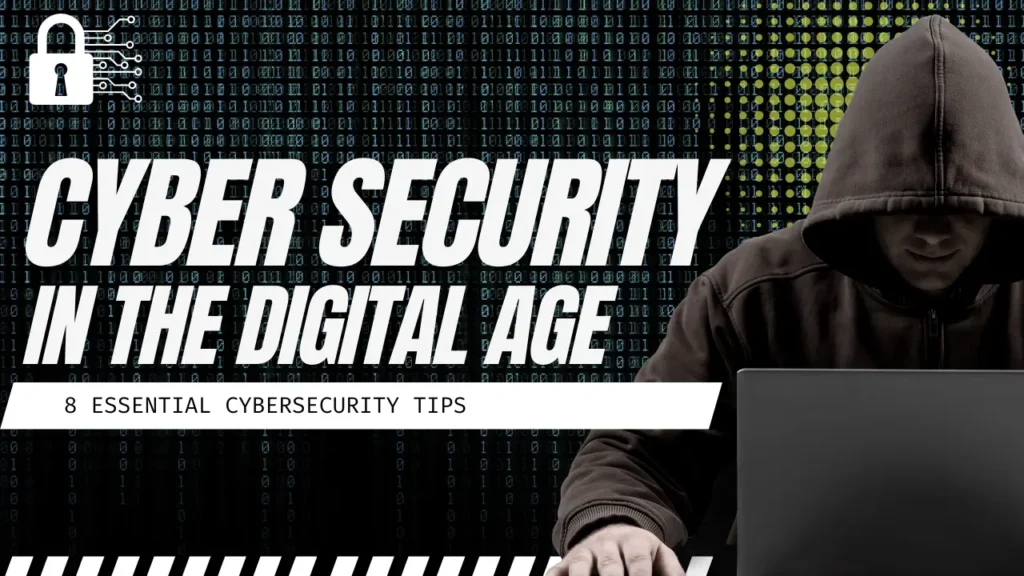In the modern digital era, Cybersecurity is more crucial than ever. Cybercriminals continuously develop new ways to compromise data and personal information as internet activity increases. The hazards, which may have disastrous consequences, are real and involve identity theft, financial fraud, and simple invasion of privacy. People must take Cybersecurity seriously and take precautions to keep themselves safe online. We’ll provide eight suggestions in this post to keep you secure and safe online.
Introduction to Cybersecurity in the Digital Age
The digital age has brought many benefits but has also created vulnerabilities that threaten our online security. More people than ever are working, shopping, and socializing online. Because of this, it’s essential to be aware of the dangers and take precautions to protect ourselves against online attacks.
Why Cybersecurity Is Important
Cybersecurity is important because it helps us stay safe from cyber-attacks and data breaches. These attacks can result in identity theft, financial loss, or even damage our personal and professional reputations.
What Are the Threats Out There?
Phishing emails, spyware, ransomware, and social engineering attacks are some of the most critical risks in the digital world, while there are many more. We must be informed about these dangers and take precautions to reduce our exposure.
Secure Passwords and Password Managers
One of the most essential steps to protect ourselves online by creating strong passwords. However, remembering multiple complex passwords is a difficult task. This is where password managers come in.
Creating Strong Passwords
Creating strong passwords involves combining uppercase and lowercase letters, numbers, and special characters. We should avoid easily guessed passwords such as “password” or “123456.”
The Benefits of Using Password Managers
Password managers can generate and store strong passwords for us, eliminating the need to remember them all. They can also help us identify weak or duplicate passwords and prompt us to change them.
Two-Factor Authentication and Verification
Two-factor authentication adds an extra layer of security to our accounts by requiring something besides our password to log in.
How Two-Factor Authentication Works
Two-factor authentication requires us to enter a code generated by a separate device or app, such as a text message or authentication app, in addition to our password.
Types of Two-Factor Authentication
Several types of two-factor authentication exist, including SMS, app-based, and biometric authentication. Choosing the type that works best for us and our devices is essential.
Antivirus Software and System Updates
Antivirus software and system updates are essential for protecting ourselves from cyber threats.
Why Antivirus Software Is Necessary
Antivirus software can detect and eliminate potential threats such as viruses, malware, and other forms of malicious software that could otherwise compromise our online security.
The Importance of System Updates
System updates include security patches that address known vulnerabilities in our devices and software. Updating our devices regularly can help to prevent cyber attacks and keep our personal information safe.
Secure and Safe Browsing Practices
Browsing the web can be a double-edged sword. On the one hand, the internet connects us to the rest of the world and is a significant and valuable resource. However, it also serves as a haven for hackers, always seeking methods to exploit vulnerabilities in our systems. As a result, it’s crucial to use secure and safe browsing techniques to protect oneself. Here are a few pieces of advice:
How to Stay Safe While Browsing the Web
- Use a secure browser: Ensure you use a browser with a proven security track record, such as Google Chrome, Mozilla Firefox, or Apple Safari.
- Keep your browser updated: Make sure your browser is updated to the latest version. Security updates are crucial to staying protected, so make sure you download them regularly.
- Use a VPN: A Virtual Private Network (VPN) can protect your online activity by encrypting your internet connection and hiding your IP address.
- Be cautious of pop-ups and ads: Avoid clicking on pop-ups and advertisements that appear on a website, as they could be malicious.
Avoiding Dangerous Websites and Downloads
- Only visit sites with HTTPS: Make sure that the website you are visiting has HTTPS in the URL instead of HTTP. The presence of an SSL/TLS certificate on the site means that your data can be secured through encryption while it is being sent across.
- Avoid downloading from unknown sources: Download files only from reputable sources. Before downloading any files, make sure to have antivirus software updated and installed.
- Check the URL before clicking a link: Be wary of shortened URLs, as they can hide the actual destination. Please hover over the link and check the URL before clicking it.
Privacy Settings and Social Media Safety
Social media has become an important part of our lives, allowing us to communicate with others. It is, however, a prime target for cybercriminals looking to steal personal information. By adjusting the privacy settings on social media platforms, you can limit the personal data others can access.
Privacy Settings on Social Media Platforms
- Facebook: In the Settings section, click on privacy to view and manage your privacy settings. You can customize who can see your posts and personal information.
- Twitter: Click on the three-dot icon in the top right corner of your profile page, then click on Settings and Privacy. You can manage your privacy and safety settings from there.
- Instagram: In the Options section, click on privacy to access the settings that control who can see your posts and personal information.
How to Stay Safe on Social Media
- Be cautious of friend requests: Only accept friend requests from people you know or have met in person. Scammers may create fake profiles to gain access to your personal information.
- Don’t overshare: Be cautious of what you post on social media. Avoid sharing personal information, such as your phone number, address, or financial information.
- Report suspicious activity: If you notice any suspicious activity on your social media account, report it immediately to the platform’s support team.
Email Security and Phishing Scams
Phishing scams are a common type of cyberattack where criminals pose as a reputable company or person to trick you into giving them personal information. Here are some tips to avoid becoming a victim of phishing scams.
How to Identify Phishing Scams
- Be wary of urgent requests: Phishing emails often try to create a sense of urgency to get you to act quickly.
- Check the sender’s address: Scammers may use an email address similar to a reputable company’s. Check the sender’s address carefully to ensure it is genuine.
- Verify the link: Hover over a link before clicking to confirm that it directs you to a genuine website.
Protecting Your Email Account
- Use a strong password: Secure your email account by using a strong, unique password that is not easily guessed.
- Enable two-factor authentication: Two-factor authentication ensures that even if someone has your password, they cannot log in to your account without a verification code.
- Be cautious of public Wi-Fi: Be careful when accessing your email on public Wi-Fi, as hackers may be able to intercept your connection.
Backup and Data Recovery Planning
Backing up your data is essential if you experience a cyberattack or hardware failure. If you lose access to your data, a backup can ensure that you can recover it quickly.
Why Backup and Data Recovery Planning Is Important
- Protects against data loss: A backup ensures you can still access your data even if your computer is compromised or fails.
- Saves time and money: A data loss incident can be costly and time-consuming. Having a backup can help you recover quickly and minimize the impact.
How to Backup Your Data
- Use cloud storage: Back up your data to cloud storage platforms like Google Drive, Dropbox, or OneDrive.
- Use an external hard drive: Back up your data to an external hard drive and store it in a safe location.
- Set up automatic backups: Schedule backups to run automatically at regular intervals to ensure that your data is always up to date. It can be easy to overlook the importance of Cybersecurity in our day-to-day lives, but taking the time to implement these tips can go a long way in protecting yourself and your information online. Following these eight tips, you can stay safe and secure in the digital age. Always remain vigilant and take Cybersecurity seriously to ensure a safer online experience.
F.A.Q.
What is the most important tip for protecting myself online?
While all of the tips in this article are important, creating strong passwords and using a password manager are crucial. This will help prevent hackers from accessing your accounts and personal information.
Do I need to use two-factor authentication?
Yes! Two-factor authentication adds an additional layer of protection by requiring both your password and a different form of identity. Even in the case that your password is stolen, this may help in preventing unauthorised access.
How often should I back up my data?
It’s a good practice to back up your data regularly, depending on how often you use your devices and create new data. Consider backing up your data at least once a week or whenever you create important new files or make significant changes to your data.
Does Cybersecurity apply to me if I dont utilize social media or participate in online banking?
Yes, you need to be concerned about Cybersecurity, even if you don’t use social media or online banking. Any time you’re online, you’re vulnerable to cyber threats. You could still be at risk of identity theft or malware infections, so protecting yourself is important regardless of your online activity.



